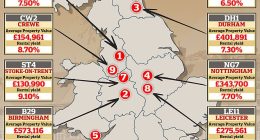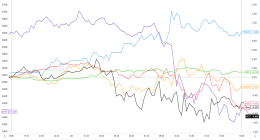HARD-UP households facing a struggle this winter are set to get a much-needed £299 cost of living payment.
The cash boost will hit bank accounts in February, just in time to help with higher energy bills at the coldest time of year.
Around 8million people on certain benefits are set to get the cost of living payment.
You’re one of them if you get Universal Credit, Pension Credit or tax credits.
Those on Jobseeker’s Allowance (JSA), Employment and Support Allowance (ESA) and income support will get it too.
Payments will start from February 6, 2024 and should land by February 22, 2004.
Read more on cost of living
But there are several ways you could miss out. We explain what you need to know, plus the help you can get instead.
You worked extra hours, got a pay rise or a bonus
How much Universal Credit you get can depend on the hours you work.
Generally the more you earn, the less you get, and if you earn a certain amount this can be reduced to zero meaning you get nothing at all.
If this happens during the qualifying period for the £299 payment – known as a nil-award – then unfortunately you won’t qualify for the cash.
Most read in Money
For the latest payments, the dates are November 13, 2023 to December 12, 2023.
Working extra hours during this time (meaning you get paid more), getting a pay rise or a bonus could reduce your payments to zero, meaning you miss out on the cash.
You’re sanctioned
You may also get a nil-award if you were sanctioned, which is when you have your benefits reduced or stopped altogether because you failed to follow your claimant commitment, for instance not turning up top a job interview.
Again, this can apply if it’s during the qualifying period of November 13, 2023 to December 12, 2023.
But there are a couple of exceptions that mean if you get a nil award, you’ll still get the cash.
Firstly, if you got no benefit payment in that period because you had deductions that were for rent or debt payments.
Secondly, if you got zero but received a hardship payment to help with rent, heating or food.
In both these cases you should still expect to get the cost of living cash.
If you miss out on the cash because of sanctions, you could try appealing it if you think it’s unfair – read our guide on how to do that.
You get paid every four weeks
A quirk of Universal Credit is that people who get paid every four weeks sometimes find two paydays fall in one monthly assessment period.
That means your UC could fall to zero in that month.
If it’s the same month as the cost of living payment qualifying period, you could miss out.
So if you were paid twice in the period from November 13, 2023 to December 12, 2023, this may mean you miss out on the cash.
You’re not claiming pension credit
As the qualifying dates for the latest cost of living payments have passed, if you make a claim for one of the benefits you won’t get the upcoming payment – with one exception.
Pension credit can be backdated several months if you make a successful claim.
That means you can make a claim now and up to March 12 that means you could also then get the extra £299.
You’ll have to have been found to be eligible for the benefit for any day between November 13, 2023 to December 12, 2023.
Nearly 1million people eligible for pension credit are not making a claim, so it’s worth checking if you’re one of them.
As well as unlocking the cost of living payment, you could get thousands of pounds a year if you’re on a low income and over state pension age, plus perks like a reduced council tax bill and free TV licence.
Read more on who’s eligible and how to make a claim in our guide.
Checks to make now to avoid delays
If none of the above applies, and you’re eligible for the latest cost of living cash, there are a few checks to make now to make sure you’re payment is not delayed.
Make sure your details are up to date with the DWP and HMRC, as these will be used to make the payment.
That includes bank details, so the cash goes to the correct account.
If you haven’t received a payment by February 23, you can report a missing one.
Or if you think you should have had one of the previous payments, you can fill in the form now.
There was a £301 payment between April 25 and May 17 this year and £300 hit bank accounts between October 31 and November 19.
Plus a £150 disability cost of living payment was made between June 20 and July 4.
To report a missing payment, go to the government website and follow the steps. You’ll need your National Insurance number.
You should double check first whether you have received it or not, so check your bank account or statements first.
You’ll see the payment separately to your usual benefits, and with the code DWP COL or DWP COLS and your National Insurance number.
Help you can get instead
If you do miss out on the extra cash, there is other help available.
You might be able to get support via the Household Support Fund.
How much you can get and how it’s paid will depend on where you live, as will the eligibility.
For instance in Dorset there’s £150 supermarket vouchers that can be spent at places like Asda and Tesco.
Meanwhile in Rutland there’s £270 in energy bill vouchers.
Check directly with your local council what’s available if you’re struggling with bills.
There are around 8,000 charities and organisations in the UK that offer cash to help struggling families.
Turn2Us has a free grants search tool so you can find out what help is available to you.
You’ll need to search for what’s available specifically in your area by entering your postcode.
It’s also worth checking you’re getting all the benefits you’re entitled to, especially if you’ve had a change of circumstances.
The quickest way to see what benefits you may be able to claim is to use one of the three benefit calculators recommended by Gov.uk.
Each one is free to use. They are:
Many energy suppliers give out grants to help with energy bills – see if you can get the help in our guide.
Low-income households can get £25 a week to help with energy bills during the winter thanks to the cold weather payment scheme too.
There have already been payouts under the scheme in some areas – see if your postcode is one of them.
You could be eligible for a budgeting loan if you’ve been on certain benefits for six months.
But while this can help cover some costs like if your boiler breaks down and you need to replace it, or you need to buy new energy appliances, like a washing machine or tumble dryer, you will need to pay the money back.
So check the other non-repayable help you could get first.
If you’re worried about paying bills, falling behind or are in debt, there are plenty of organisations where you can seek advice for free, including:
Read more on The Sun
This post first appeared on thesun.co.uk










